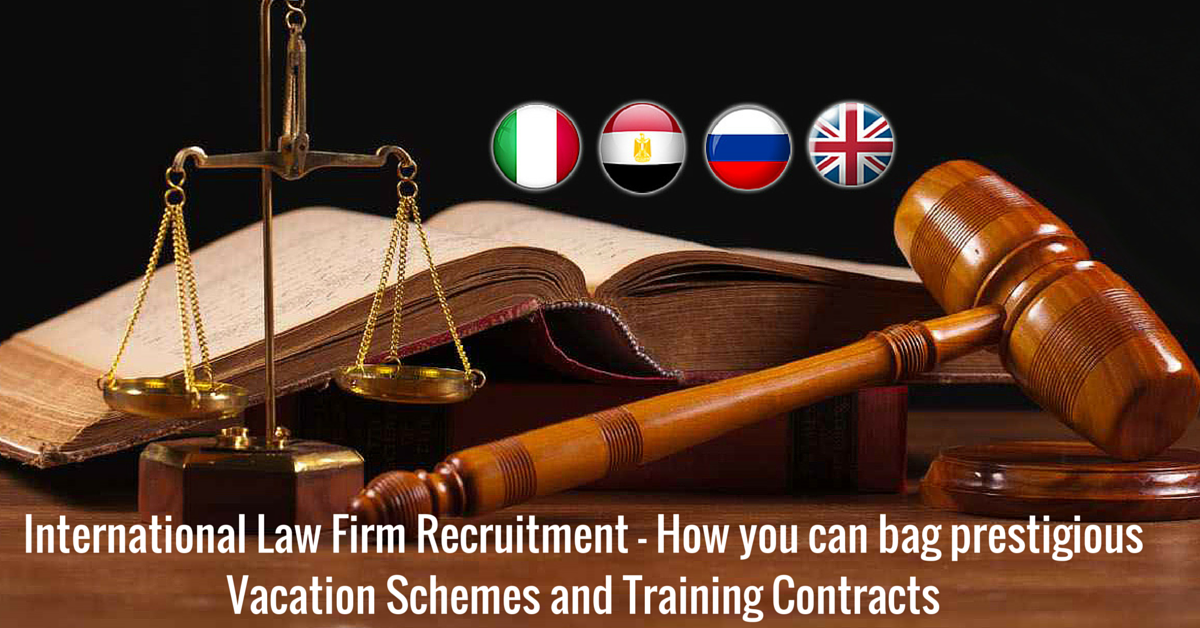
‘Magic circle’, ‘silver circle’, ‘chasing pack’ and ‘the City’ are some of the words familiar to law students who aim for an international legal career. How can you land a training contract or a vacation scheme at a top foreign law firm? They all admit that it is a matter of great prestige to work in a foreign law firm- the nature of the work is more cutting-edge, you get more exposure, there is quality training, good branding for your CV, the pay is excellent, etc.
Do foreign law firms recruit differently? What skill-sets are they looking for?
It seems that the kind of skill-sets a foreign law firm is looking for are very different. Most people fail to analyze or figure outwhat those skill-sets are.
Interestingly, many of those who have failed to make it to foreign law firms have effortlessly made it to the best Indian law firms, which clearly have the same international standards and reputation for quality. Why the difference in recruitment styles, then?
The Indian way
Indian firms are, first and foremost, looking for people who can do their work for them, and who can do it well. They want people who work hard and have good technical calibre. This, in their view, is often demonstrated by rank (I am not contesting the correctness of using rank as a measure of ability here). This leads them to recruit top rankers to start with, or those who have interned with them previously. They want you to be able to do whatever is necessary for their business. Good academics plus good internships, along with a decent interview, which is usually not very rigorous, usually would get you through to any Indian law firm. In any case, a good internship with a firm where your work and presence get noticed (positively) trumps everything else.
The international law firm mental framework
It is quite different with foreign law firms. To start with, they are way bigger in size and rely on very different methods to recruit talent. I have myself sat through many magic and silver circle interviews, and spoken at length to friends and seniors who have given interviews. After having some experience at an Indian law firm, it is easy to see what skills a foreign law firm is looking out for.
5 qualities you must convince an international law firm about in your interview
#1: You are an exciting person. You are not nerdy, dull or boring.
An international law firm is looking for an exciting lawyer because it expects him or her to be involved with a wide range of persons across different cultures. Remember, you don’t build relationships simply by doing technical work like a machine. You may need to build friendships by sharing new experiences, talking about different issues, and connecting with different people, which you can supplement with your quality work into a working professional relationship.
Second, an international law firm is going to look at you as an asset to the development of their India practice. Even if you work entirely on UK or EU law issues and transactions, you will realise that there will often be a scenario where one of the parties is Indian. You are going to be involved with India in many ways, and an enhanced personality will help a magic or silver circle firm showcase a vibrant image for its India work.
Therefore, focus on doing interesting and unusual things in life. Don’t do the same things that everyone does all the time. Learning less-played sports (archery), engaging in adventure activities (scuba-diving, sky-diving, mountaineering, etc.), even running a half-marathon – anything that is not so common around you, can suddenly make the interviewer see you as a ‘prize’ for their organization.
Also, your life will be more exciting, if you have a few new experiences. Who likes a dull and boring colleague?
#2. You don’t mind settling abroad
You will not realize this in law school, but most people want to ‘settle’ down professionally, and they want to settle soon in life, and remain in their home city / home country. An international law firm would want you to be open to staying abroad for a long period of time, and possibly even settling there if required for the firm’s benefit. In fact, you can have your preference on where you would like to be based (usually, it’s going to be London to start with) but you should be willing to move if the firm’s work requires you to (you would ideally be moved to Hong Kong or Singapore, unless it is possible to relocate you to India itself). This should be demonstrated in the course of your interview.
#3. You look at things from a business perspective
Your work is going to be related to assisting clients with law pertaining to ‘their business’. Therefore, you must be able to assess the effects of different kinds of events and developments around you – social, political, etc. on business.
For example:
1. Elections in a country might imply that investors may be cautious to invest further (or may be willing to pull out) if the ruling party is investor-friendly, and if there are chances that it might lose. This is because a political regime different from the incumbents may have a relatively ‘closed door’ policy towards foreign investment.
2. Possibility of a strict environment protection law means increased costs for businesses (in the manufacturing sector, although NOT normally in services).
Think about cross-border effects. And think about what different interest groups will perceive. For example, if a new regulation is being passed:
- Will it increase confidence of foreign investors?
- Does it strengthen your country’s stance in the international fraternity?
- What effect does it have on employees? Does it affect the ability of a business to attract the right talent?
- Does it increase costs of doing business (if a regulation requires significant additional compliance)?
- Does it add any element of uncertainty to commercial activity (if a law is unclear)?
#4. You carry your common-sense everywhere with you, including the interview hall
Most seniors you would have asked would have told you that you will do well if you use your common-sense in interviews. Well, that doesn’t tell you much. How would it be possible that everyone only had to use their common-sense to succeed in such a vital exercise of cracking a prestigious law firm’ s interview? And if they all only had to use their common-sense, why would some make it, and others fail? Is the interview a test of common-sense? Why is common-sense so much emphasized upon in interviews?
For three reasons:
1. People go over-prepared for interviews and have scripted replies for most questions.
2. Their replies are similar to everyone else’s, and do not indicate in any way that they are unique.
3. People are too nervous in the interview.
Interviewers often ask tricky or unusual questions to check whether you are struck off your feet if you are faced with something unpredictable, or if you are able to answer calmly and logically. You may not be correct, and your perspective may differ, but the ability to stay calm and reason things out will hold you in good stead.
#5: You know yourself
Interviewers want to see that you are sure about your abilities in an interview. Most interviewers want you to know your weaknesses and your strengths. Make sure that these are not pre-scripted ones, such as ‘I work too hard’, or ‘I am a perfectionist’.
Also, don’t make your weaknesses appear in negative light. Don’t say, ‘I am a bad communicator’, instead, you can say that, ‘I realized while working in a college fest committee that I was not going all the way to explain things to my team which affected their motivation levels, and since then I make an effort to carefully convey all relevant details to whoever I work with’. Remember, choice of words is very important.
Is it important to be perfect?
Ask anyone who’s made it through an interview with an international law firm, and they will be able to rattle off at least two to three mistakes that they remember having made in the interview. Imagine, if on the other hand, they had a plain interview. No mistakes, nothing exciting or controversial said, and nothing memorable to take away from it. That’s not a good sign at all.
It is not important to be perfect. Be excited, make it count.
A good conversation can make you bag it – Learn about the ‘gut feeling’ of the interviewer
At the end of the day, focus on having a good conversation. It is not easy to have a good conversation, and a good conversation is very different from a perfect conversation. In fact, a perfect conversation cannot exist. You should aim to have a conversation where the interviewer is able to get some snapshot of your life and a general idea of who you are, what you are like. They should know about some interesting experiences you have had, and your descriptions should make them ‘feel’ that you have the qualities they are looking for – inclination to try new things, look at old things from a fresh perspective, meet people, desire to try and fix problems, etc. It doesn’t matter whether your interviewer has done activities similar to ones that you have done.
Remember, when they decide to recruit you, they are not going to tick off the qualities based on what you ‘said’ to them, but based on what you made them ‘feel’. It’s going to be a gut feeling for them. You have to ensure that this feeling is in your favour.
How should you feel in an interview?
Well, you can’t think freely if you have been cramming and reading the night before. If you go prepared, you will expect and want questions to be based around areas you have prepared on. Everytime the interviewer asks you a question, you will think, ‘What did I read that is nearest to this’, or you will think ‘What do I do, I never read about this’, which will make you nervous.
On the other hand, if you stop reading and preparing a few days before (apart from reading broader developments in India and across the world from any newspaper or periodical, which you should anyway be doing), you are going to feel fresh, and your answers are going to come ‘from inside’, on their own.
Last minute thoughts: The mental makeup before an interview
Before going to the interview, imagine that you are going on a long, circular, winding slide in a water park. You know where you enter, but you don’t know where exactly it goes. All you know is that it will be exciting, and that you will end up in water at the end, and that you will be more or less safe, even if you are imbalanced immediately after the ride.
 Serato DJ Crack 2025Serato DJ PRO Crack
Serato DJ Crack 2025Serato DJ PRO Crack










 Allow notifications
Allow notifications


